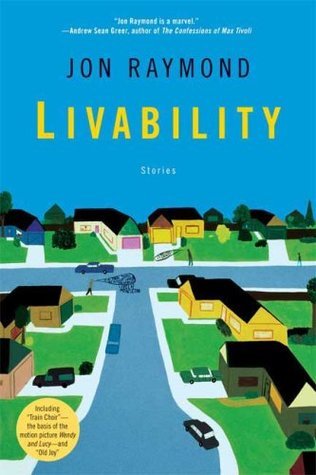Like his latest novel, God + Sex (2025; reviewed by me), these 2009 stories evoke the teller's firsthand scenarios. Teachers in middle age, creative classes on the Left Coast with plenty of either trust funds or cushy gigs, rougher types lurking off the highway in forests or campsites, introspective types quite articulate who watch their loutish neighbors or lumbering acquaintances bereft of college degrees. It's undoubtedly Raymond's Portland sensibility, distilled into narratives redolent of a campus workshop.
As I'm familiar with these settings, I admit his talents lie in illustrating the Pacific Northwest milieu. No wonder the first and last entries were adapted for arthouse audiences, and the "hippie diaspora." Let's blame it on the "Californians" yoga-peddling, boutique enterprise which displaced the faux-Western joints. If both demographics share joints of a chemically enhanced nature. As for Nature Herself, she looms in shadows and crannies, where sorrow...which is "old joy" experienced past its shelf life...lingers and summons loss. Animals wait for self-aggrandizing, hubristic humans to rot.
Moods, then, stick. Although forlorn plots wander. Raymond sketches recognizable characters, but as with an apparently Native American family (crosshatched rather than boldfaced), he stumbles into a stereotype of coming of age full of fisticuffs and laden with Deep Wisdom from Noble Dying Elder...I think he's on firmer grounds with his deracinated, secularist, and New Age-addled seekers as vegan spenders and weekend getaway brooding liberal arts grads. But he's not bad on gentrification in PDX.
Both "Benny" about a tweaker buddy (see also "Old Joy") and "The Suckling Pig" on class distinctions in affluent Lake Oswego share insights into the overlap among disparate arrivals to America, and how the new century ruthlessly divided the successful sporting Porsches from the despairing who hang out at Plaid Pantry. Raymond observes his city with a knowledgeable eye towards displacement and drugs.
Yet the pacing slows. Conversation echoes those we join. The savvier, successful, worldier types try to take advantage of their less sophisticated, less capable counterparts. Real-time seems to pass as long stretches of small talk, flirtation, banter, reconciliation, and avoidance alternate; this accuracy attests to Raymond's ear for convincing exchanges on a page, mirroring his screenplay credentials: but they don't enliven his resigned alter ego of "New Shoes" effectively; febrile "Young Bodies" better catches consumer-driven, mall-encompassing, monoculture's last retail gasp under G.W. Bush's realpolitik.
So, the fidelity to style reveals mixed results. He's comfortable with gradual revelations of truth, even if the elapsed drama doesn't always pay off with stunning conclusions or thrilling episodes in print. In the final tale, "Train Choir," Raymond's able to master the genre. It's clear why this became a choice for Kelly Reichardt to film as "Wendy + Lucy," as entering into the protagonist, here named Verna, on her fumbled journey halfway between Muncie, Indiana, and a fish-processing Alaskan gig, we witness her frustration, hopes, and weariness as her itinerant fate drags her down into the underclass, trying to survive by sleeping in parking lots and hobo camps. It's a rewarding conclusion showing his best.

